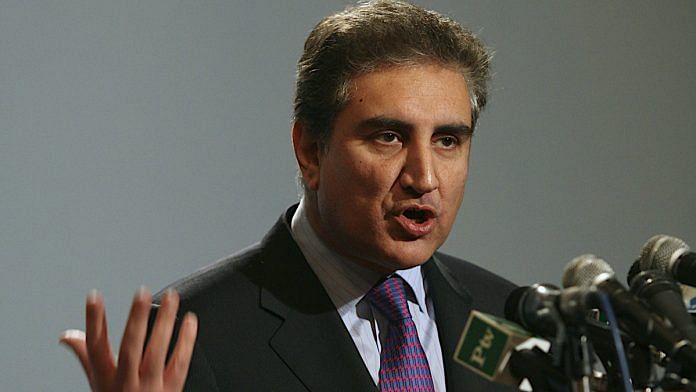New Delhi: Pakistan Foreign Minister Shah Mahmood Qureshi had a busy week in the headlines this week, whether it was his refusal to attend Friday’s meeting of Organisation of Islamic Cooperation (OIC) foreign ministers over the invitation extended to India’s Sushma Swaraj, or his admission that members of the Pakistan government had been in touch with the Jaish-e-Mohammed (JeM).
His recent comments to American news channel CNN and British broadcaster BBC, acknowledging that JeM chief Masood Azhar is in Pakistan, kicked up a storm, with many pointing out online that his statements established India’s case that Pakistan harbours terrorists.
A day after Pakistan FM tells CNN that Masood Azhar is in Pakistan, he tells BBC the government is in touch with banned organisation Jaish e Mohammad. Hope he gives a third interview today….to complete India's dossier for the UNSC. https://t.co/Y7G6wWVL5z
— Suhasini Haidar (@suhasinih) March 2, 2019
Masood Azhar, leader of the terrorist organisation Jaish-e-Mohammed, which has claimed the Pulwana suicide bombing attack that killed at least 40 people, is in Pakistan and he’s not even arrested, Pakistan minister Shah Mahmood Qureshi has recognizedpic.twitter.com/YubV7frMLo
— Alfons López Tena (@alfonslopeztena) March 1, 2019
Qureshi, 62, is a sharply-dressed politician who has dabbled in all the primary political parties of Pakistan and is currently serving his second term at the helm of the foreign office.
A member of an elite Pakistani family that claims descent from a revered Sufi saint, Qureshi, an agriculturalist, has over 30 years in politics.
He was Pakistan’s foreign minister when terrorists of the Lashkar-e-Tayyeba struck Mumbai in November 2008, and, incidentally, on a visit to India when the siege began.
Also read: India’s dream of isolating Pakistan won’t be fulfilled, says foreign minister Qureshi
Who is S.M. Qureshi?
Qureshi was born in Murree, Pakistan Punjab, on 22 June 1956, to a wealthy political family that claims descent from the 12th century Sufi saint Bahauddin Zakariya, and continues to serve as caretakers for his shrine.
According to the website of his party, the Imran Khan-led Pakistan Tehreek-e-Insaf (PTI), Qureshi’s father Sajjad Hussain Qureshi, a close associate of dictator Zia-ul-Haq, served as governor of Punjab between 1985 and 1988, while his grandfather Mureed Hussain Qureshi was a member of legislative assembly under the British Raj.
For his Bachelor’s degree, Qureshi enrolled at Lahore’s Forman Christian College, where he pursued history, before securing a Master’s in law and politics from Cambridge University, UK.
Qureshi’s first brush with electoral politics came in 1985, when he contested and won a seat to the Punjab assembly. The election that year was held on a non-party basis.
A year later, he joined the Pakistan Muslim League (PML).
When the PML split, he joined the Nawaz Sharif faction, called PML(N), and served as Punjab planning and development minister between 1988 and 1990, when Nawaz Sharif was chief minister. From 1990-93, when Sharif was prime minister, Qureshi was Punjab’s finance minister.
When Nawaz Sharif denied him a National Assembly (the Pakistan parliament) ticket to contest the 1993 election, he left the PML (N) and moved to the Pakistan Peoples Party (PPP) of the Bhuttos.
Qureshi stayed in PPP from 1993 to 2011, serving as the mayor of Multan from 2000-02 and Pakistan’s minister of foreign affairs in the Yousaf Raza Gilani government from 2008-11.
In 2011, he joined the PTI as the party’s vice-chairman.
Also read: Masood Azhar in Pakistan and very unwell, says foreign minister Shah Mahmood Qureshi
Many a controversy
Qureshi, who has reportedly struggled to establish himself as a popular leader, has been accused by his brother of using the family’s link to Bahauddin Zakariya to establish himself in the PTI.
It was barely three months into his second tenure as foreign minister that he first drew censure for his out-of-turn remarks.
In November 2018, after India cancelled Swaraj’s meeting with Qureshi on the sidelines of the UN General Assembly, Qureshi made a terribly undiplomatic comment about her age.
“I don’t know what happened, while I can’t say that Sushma ji felt shy at this age, it seems Indian politics had come in between,” he said.
The remarks that have landed him in headlines over the past week were supposed to be aimed at India as well, but were widely seen as a self-goal for Pakistan.
In an interview to CNN, asked if Pakistan would act against the JeM, which took responsibility for the Pulwama terror attack in which 40 CRPF soldiers were killed, Qureshi repeated old tropes, seemingly unaware that IAF planes had only days ago struck inside Pakistani territory and destroyed camps of the terror group.
If India gives us “evidence” which is “acceptable in our courts”, the judicial process would ensue, Qureshi told CNN.
He went on to add that Masood Azhar, one of the three terrorists exchanged at Kandahar after the hijacking of IC-814, was “not well at all”.
“He is in Pakistan, according to my information. He is unwell to the extent that he can’t leave his house, because he’s really unwell,” Qureshi told CNN.
In another interview, this one to the BBC, Qureshi said “people over here” had been in touch with JeM chief Masood Azhar, and the terror outfit had denied involvement in the Pulwama attack.
When the interviewer asked who exactly had been in touch with the JeM, he gulped and spluttered. “There are people known to them [Jaish],” Qureshi said.
In doing so, Qureshi broke a somewhat cardinal rule of the Pakistani establishment. For decades, Pakistan’s military and its intelligence service, the ISI, have used terror groups to carry out attacks in India.
But the establishment always keeps an arm’s length from these terror groups, to keep up an element of deniability to the outside world.
Pakistan’s politicians, especially, have never acknowledged contact with the leaders of these terrorist organisations.
Also read: Pakistan’s 50-year self-destruction in blood-feud with India & how Imran Khan can halt it




Someone has tweeted, Consider me India’s Ambassador in Pakistan …